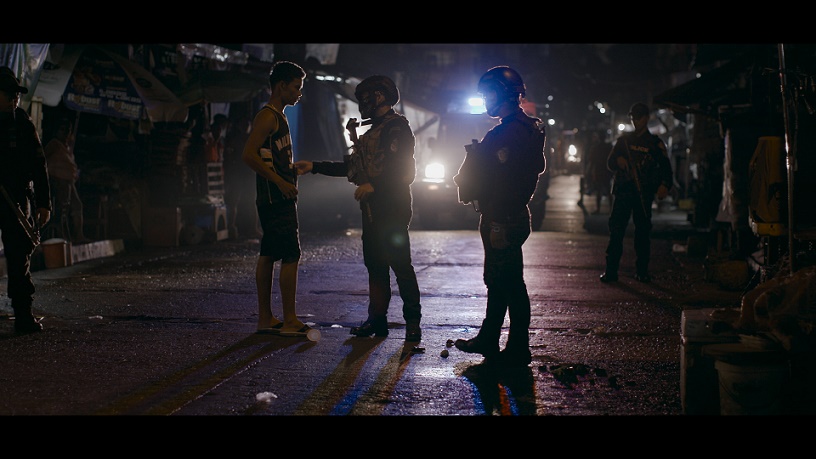
A scene from the documentary, “On the President’s Orders.”
The director of a scathing documentary on the President Duterte’s bloody drug war that is set to be shown in the United States on October 4, urged officials of the Duterte government and supporters to watch the film.
“On the President’s Orders” by Emmy Award-winning filmmakers James Jones and Olivier Sarbil focused on the Caloocan City Police’s handling of the war against illegal drugs, the banner program of the Duterte administration.
“…I urge people in the administration and Duterte supporters at home and abroad to watch the film, to engage in debate, and to understand you know that the people who are dying do have families too. Hopefully they could watch and understand that it’s a complicated issue, even if you support the drug war,” Jones said in a video shown after the film’s screening.
The film was shown in private screenings sponsored by iDEFEND and Active Vista last week.
Jones issued the challenge to Duterte officials and supporters after Presidential Spokesperson Salvador Panelo, based on the two-minute trailer that he saw, called the film “overly dramatized” and “falsely portrays a dangerous Philippines and a murderous government.”
“The docufilm, together with its so-called cinematic investigation on drug-related deaths, evidently has been deliberately overdramatized for the purpose, apart from putting the Philippines in a bad light, of creating a better cinematic experience for its audience,” Panelo said in a statement.
Jones said, “One thing that the police said to us repeatedly was ‘you understand these drug pushers are not like you and I, they’re not humans, they’re animals.’ Well you know we filmed with their families, and whatever these people were, these were not big drug dealers and certainly were human and had people who loved them.”
Government numbers on deaths from Duterte’s drug war vary but they are in the level of 6,000 as of May 2019. The 2017 accomplishment of the Duterte administration, however, put the total number deaths during the Duterte Administration’s anti-drug war from July 1, 2016 to November 27, 2017 to 20,322.
A July 2019 survey by Social Weather Stations showed 82 percent of adult Filipinos were satisfied with the administration’s campaign against illegal drugs
Rosemarie Trajano, secretary-general of the Philippine Alliance of Human Rights Advocates said she believes the respondents “agree with the policy” but they “do not agree with the killings.”
Data from the Philippine Drug Enforcement Agency shows that Caloocan City in the National Capital Region, the focus of the documentary, had highest number of drug-affected barangays in first eight months of 2016.
Caloocan city is where the killing by policemen of a 17-year old student, Kian de los Santos, on Aug. 16, 2017 was caught on CCTV and caused public outrage. The police chief then was Senior Superintendent Chito Bersaluna who was replaced by Senior Superintendent Jemar Modequillo, who was the chief of the Caloocan City police at the time the documentary was made.
Modequillo was relieved from his post in March 2018 over a number of unsolved deaths of suspected drug personalities, who were killed vigilante-style or those committed by riding-in-tandems.
The film shows two points of view: those of the residents living in fear
of being killed, and of those of the policemen who have the intention
to kill if necessary, in order to comply with the president’s marching
order to “not stop until the last drug lord, the last financier and the
last pusher have surrendered or put behind bars or below the ground if
they so wish.”
There’s a scene of policemen intimidating bystanders at night, stopping residents on their way to search their pockets, and forcing some to have their names cleared from illegal drug use in order to prevent trouble.
There is also a scene where Modequillo himself admitted that they would kill suspected drug users “if necessary.”
“It can be considered what you call an extrajudicial confession, but it’s a matter of evidence. That alone is probably not enough but there’s a certain evidentiary weight into it. Certainly you can use it,” Alternative Law Groups project coordinator Atty. Gian Miko Arabejo.
“When evaluating evidence, you have to look at the case that you’re filing, for example murder, sa (in) murder may (there are) elements: intent to kill…namatay ba (is there death), so mga ganoon (and others). In court you have to prove those elements, before you prove the crime. To prove those elements, you need evidence. If we are talking about the intention to kill…that alone is not enough, yung ganoon sigurong (that kind of) statement sa (in the) film, what we call as corroborative evidence, ito ‘yung (it is the) evidence that strengthens your claim, but you still have to show your main evidence that directly proves that intent to kill,” he explained.
Nymia Pimentel-Simbulan PAHRA chairperson noted that there is something “abnormal” in the current situation where people have to watch a film secretly and be conscious of security when the Philippines is supposedly a democracy..“’Yun ang patunay na (This is a proof) there is something wrong under the current government. There is something wrong under the situation that we are currently experiencing,” she said.
On the film’s first screening, Active Vista Executive Director Leni Velasco called on the audience to “not allow the injustice of erasing our historical memory as a nation that this government has done to the thousands of victims of Martial Rule to be done as well to thousands of victims of the drug war.”
“We need to remind ourselves the bluntness and force of this trauma from all the killings and the grave human rights violations are shattering our already fragile sense of nationhood. And the horror we are experiencing is more intimate, more personal. It has opened up a tear in our social and moral fabric and challenged our very humanity,” she added.– with reports from Merinette Retona